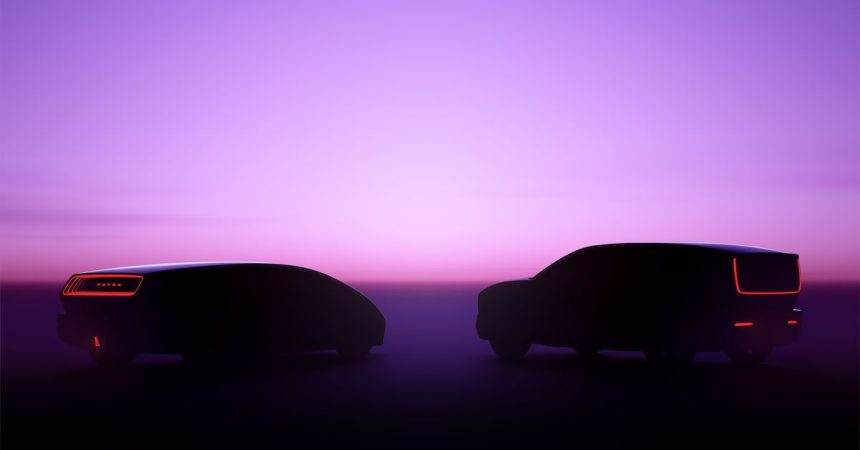Honda is poised to unveil its groundbreaking Honda Zero EV series at the upcoming Consumer Electronics Show (CES) in Las Vegas this January. This global EV series represents a significant departure from the current landscape of bulky electric SUVs and trucks, promising a lighter, more futuristic approach to electric mobility. Honda has centered the Zero series around three core principles: “thin,” “light,” and “wise.” These tenets reflect the company’s ambition to create EVs that are not only aesthetically distinct but also technologically advanced and intelligently designed. The teaser images released by Honda showcase two concept vehicles, the Saloon and the Space-Hub, hinting at the design language of the upcoming series. The Saloon, a sleek fastback, features unique rectangular lights reminiscent of a vintage Dustbuster, while the Space-Hub, a minivan-esque vehicle, boasts minimal overhangs and a rear light bar echoing the design of Rivian’s electric delivery vans. CES promises a deeper dive into the “wise” principle, with Honda revealing details about its proprietary operating system, automated driving technologies, and the system-on-a-chip that will underpin the Honda Zero vehicles.
The “wise” principle underscores Honda’s commitment to intelligent vehicle design. This encompasses not only the technological advancements within the vehicles but also a holistic approach to the user experience. The new operating system, developed specifically for the Honda Zero series, will likely play a crucial role in delivering a seamless and intuitive interface for drivers and passengers. Details about the automated driving technologies remain scarce, but the inclusion suggests Honda’s ambition to incorporate advanced driver-assistance systems (ADAS) into its EVs, potentially paving the way for higher levels of autonomy in the future. The system-on-a-chip (SoC) will serve as the central processing unit for the vehicles, integrating various functions and enabling the advanced features promised by Honda. This proprietary SoC likely represents a significant investment in technology, showcasing Honda’s dedication to developing cutting-edge EV technology.
The teaser images offer a glimpse into the aesthetic direction of the Honda Zero series. The Saloon’s fastback silhouette, combined with its distinctive rectangular lights, creates a futuristic yet minimalist impression. This design language departs from the more conventional designs seen in many current EVs, suggesting Honda’s intention to carve out a unique identity in the electric vehicle market. The Space-Hub, with its minivan-like profile and minimalist overhangs, hints at a focus on practicality and interior space. The rear light bar, similar to that of Rivian’s delivery vans, suggests a potential emphasis on functionality and visibility. These two distinct designs showcase Honda’s exploration of different form factors within the Zero series, catering to varying customer needs and preferences.
Preliminary testing of the Honda Zero platform reveals promising performance characteristics, particularly in terms of handling and acceleration. The low center of gravity, achieved by positioning the battery pack in the vehicle’s floor, contributes to enhanced stability and cornering agility. This layout mimics the design philosophy of many other EV platforms, leveraging the weight of the battery pack to improve handling dynamics. The electric powertrain delivers quick acceleration and responsive performance, as demonstrated by test drives that achieved speeds approaching 70 mph in a short distance. This suggests that the Honda Zero EVs will offer a dynamic and engaging driving experience, matching or exceeding the performance of comparable electric vehicles on the market.
Honda’s strategic focus on lightness extends beyond the physical weight of the vehicles. The “light” principle likely encompasses a broader philosophy of efficiency and minimalism. This could translate to streamlined designs, optimized powertrains, and a focus on reducing the environmental impact of the vehicles throughout their lifecycle. By prioritizing lightness, Honda aims to create EVs that are not only agile and responsive but also sustainable and resource-efficient. This aligns with the growing emphasis on sustainability within the automotive industry, as manufacturers strive to reduce their carbon footprint and develop environmentally responsible products.
The upcoming CES promises a more comprehensive understanding of Honda’s vision for the Zero series. The company’s emphasis on the “wise” principle, combined with the intriguing designs of the Saloon and Space-Hub concepts, suggests a compelling approach to electric mobility. The integration of a proprietary operating system, advanced automated driving technologies, and a dedicated system-on-a-chip further underscores Honda’s commitment to technological innovation. As the electric vehicle market continues to evolve, Honda’s Zero series appears poised to make a significant contribution, offering a unique blend of design, performance, and intelligent technology. The full reveal at CES will undoubtedly be a highly anticipated event, providing valuable insights into the future of electric vehicles and Honda’s role in shaping that future.



